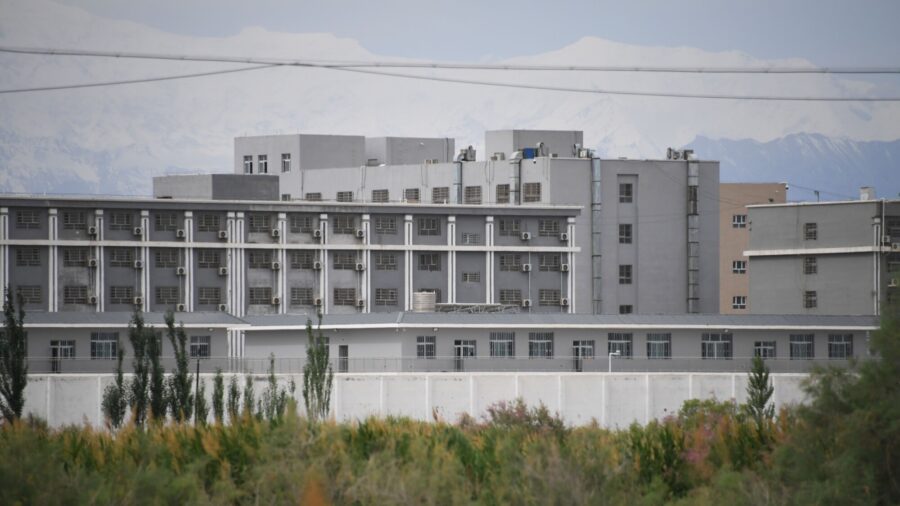A major EU-China investment deal has been thrown into question after China resorted to aggressive diplomacy in response to EU sanctions.
The European Union, the United States, the UK, and Canada on March 22 unveiled coordinated sanctions against Chinese officials responsible for the Chinese Communist Party’s (CCP) oppressive policy in China’s far-western Xinjiang region. The EU sanctioned four Chinese officials under the new EU Global Human Rights Sanctions Regime, which went into effect in December last year.
The CCP is committing genocide against Uyghurs in Xinjiang, subjecting them to forced sterilization, forced abortion, torture, forced labor, and the removal of children from their families. Additionally, more than one million Uyghurs are being detained inside internment camps—facilities the communist regime has defended as “vocational training schools.”
China countered by slapping its own sanctions on Canadian parliamentarians, U.S religious-rights officials, UK lawmakers, and EU politicians—including five members of the European Parliament.
The Chinese regime’s apparent retaliation angered the European governments, with at least nine countries—including Belgium, Denmark, France, and Sweden—summoning China’s ambassadors in their countries to voice protest.
Chinese embassies in the European Union also took countermeasures. According to Chinese state-run media Guancha, Chinese embassies in 15 European countries have lodged complaints about the Xinjiang sanctions at the countries’ foreign ministries as of March 25.
The strained relations between China and the EU now put the bilateral investment deal—which was inked in December last year after seven years of negotiations—on the brink of collapse. The deal, which has yet to be ratified by the European Parliament and approved by the EU Council, has long been criticized over China’s continued human rights abuses and poor labor conditions.
On March 27, Norbert Röttgen, chairman of the Foreign Affairs Committee in Germany’s Bundestag, the German parliament, said the investment deal was not going anywhere at the moment, according to the German daily newspaper Augsburger Allgemeine.
Röttgen said that he could not imagine that there would be consensus in the European Parliament to ratify the investment deal as long as China punishes members of the European Parliament for simply “exercising their freedom of expression.”
“The EU and the member states should make this clear to Beijing,” Röttgen said.
Röttgen is not the only one to voice concerns about the investment deal. According to a March 26 article by the German daily Merkur, three of the four biggest parties in the European Parliament have said that they are against ratification of the investment deal as long as China’s sanctions are in place.
Jörg Wuttke, president of the European Chamber of Commerce in China, told Merkur that the investment deal would not be discussed in the European Parliament for the foreseeable future.
China’s Ministry of Foreign Affairs, in a statement on March 22, criticized the EU sanctions as based on “nothing but lies and disinformation.” It asked Brussels to “reflect on itself [and] face squarely the severity of its mistake” and stop “interfering in [others’] internal affairs.”
Also on March 22, Munich-based World Uyghur Congress (WUC) applauded the EU sanctions on the four Chinese officials in a statement.
“These sanctions send a clear message from the European Union to the CCP that they can no longer commit a genocide against the Uyghurs with impunity,” stated Dolkun Isa, WUC President.
He added: “We thank the European Union for this vital step and urge the rest of the international community to follow suit. Only through concrete action like this can we stop the Uyghur genocide and end the suffering of the Uyghur people.”
On March 27, U.S. Secretary of State Antony Blinken condemned Beijing over its sanctions of two U.S. officials, saying China’s moves “only contribute to the growing international scrutiny of the ongoing genocide and crimes against humanity in Xinjiang.”
“While the US, UK, Canada and EU have sanctioned human rights violators, the Chinese government has chosen to sanction human rights defenders, committees and leading elected legislators around the world,” British NGO Hong Kong Watch stated in a statement on Saturday over China’s sanctions.
It added: “All pretence of innocence [by Beijing] has now faded away and the wolf warriors are biting back, the world must unify to stand with Uyghurs, Hong Kongers, and others facing persecution by the Chinese government.”
In recent years, the CCP has increasingly taken on an aggressive form of “wolf warrior” diplomacy in an effort to fend off mounting international criticism of the regime.
From The Epoch Times

